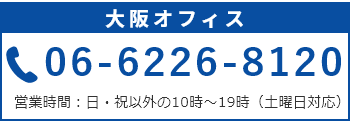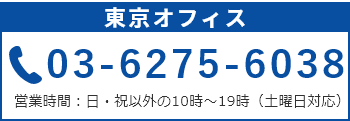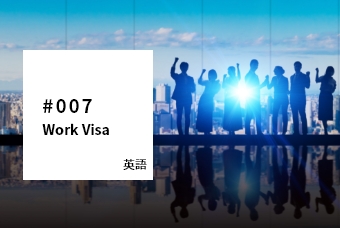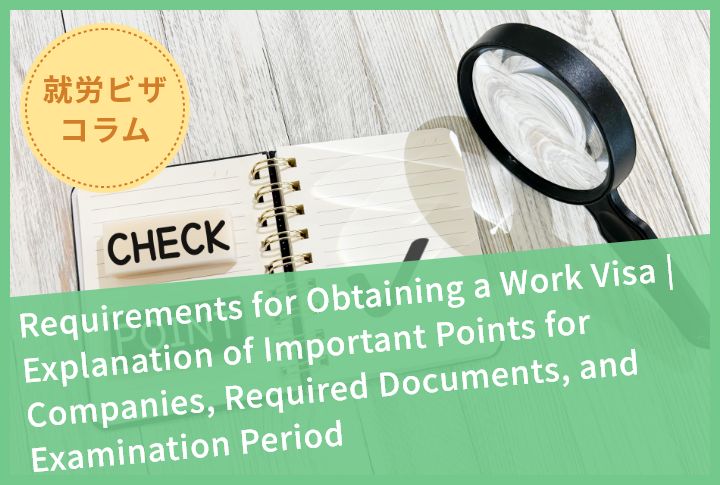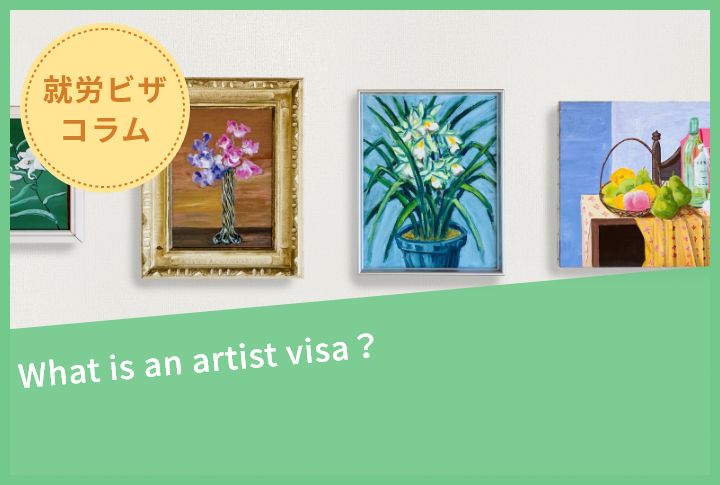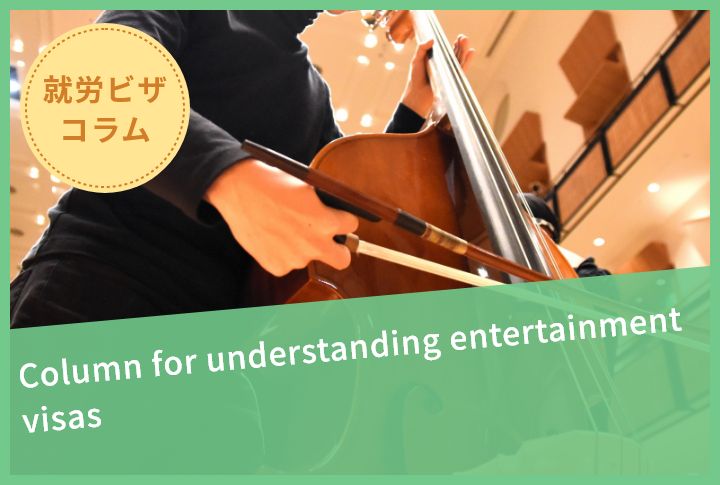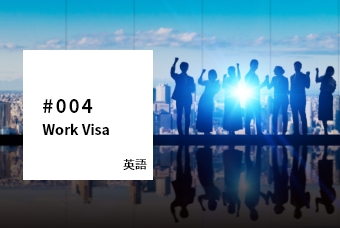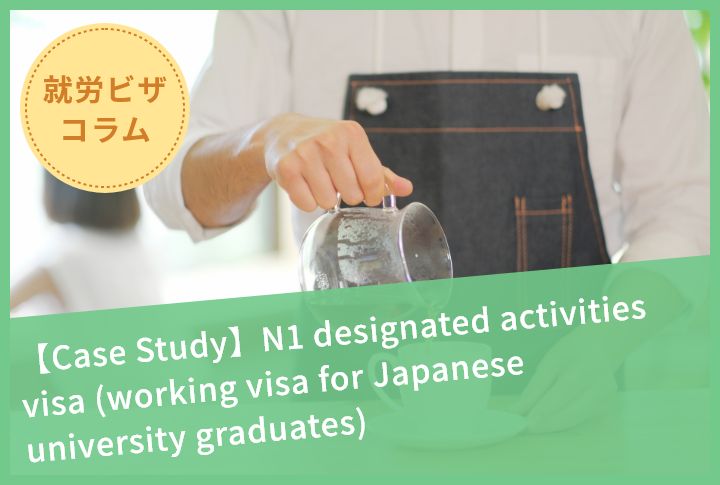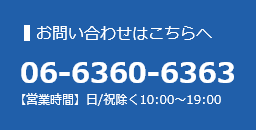Administrative scrivener explain 19 types of work visas
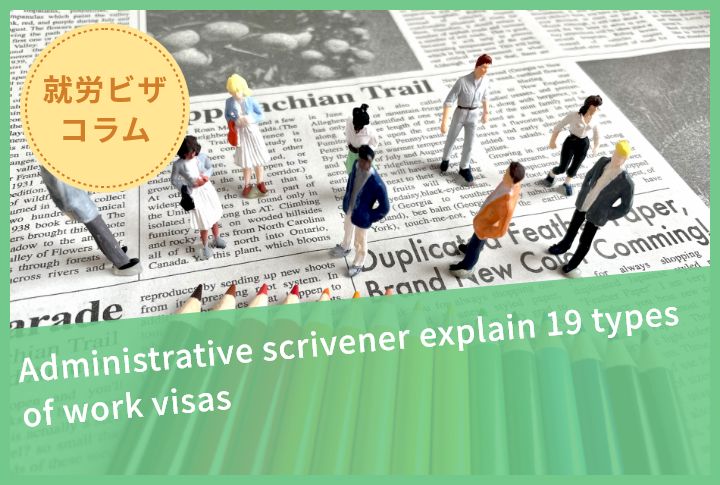
Currently, there are roughly 19 types of work visas, but there are not many websites that explain about work visas in a cross-sectional way.
In this article, we would like to focus on the 19 types of work visas and explain the purposes of their establishment and what are the occupations subject to such visas.
We try to simplify the explanation in this article, but if you would like to know more about each visa, please refer to the relevant links.
Index
1. Types of work visas in Japan
We will explain about each type of work visa, relevant occupations, and periods of stay.
(1) A diplomat visa
The purpose of diplomat visas is to maintain and improve diplomatic relations between Japan and other countries.
This visa is not generally known, but this one is applicable to ambassadors, ministers, and consuls-general of foreign government, members of delegations, etc. and their families.
There is no specific period of stay, like 1 year or 3 years, for diplomat visas like regular work visas, and the diplomat visa holders are permitted to stay in Japan as long as they continue diplomacy activities, which is a unique characteristic of this visa.
(2) An official visa
The purpose of official visas is to maintain and develop friendly relations between Japan and other countries. Similar to the diplomat visas in above (1), official visas are not generally known. They apply to staff of embassies and consulates of foreign governments, and those who are dispatched by international organizations, etc. for public affairs, as well as their families, etc.
Period of stay is either 5 years, 3 years, 1 year, 3 months, 30 days, or 15 days.
(3) A professor visa
The purpose of professor visas is to invite university professors, etc. from other countries for the development and improvement of academic research. This is a work visa for university faculty members, etc. and is applicable to university professors, associate professors, lecturers, assistants, etc.
Professor visas are a kind of work visa, so even if the applicant is a professor, if he/she will do research or provide education at universities, etc. without charge, a professor visa is not applicable, but a cultural activities visa is the one he/she should obtain. Therefore, it is necessary to be careful not to choose a wrong visa.
Period of stay is either 5 years, 3 years, 1 year, or 3 months.
(4) An artist visa
The purpose of artist visas is to promote international exchange through art. As the name implies, it is a work visa for artists, such as composers, lyricists, painters, sculptors, craftsmen, and photographers.
Since artist visas are a type of work visa, if the applicant engages in artistic activities that do not involve any income, he/she should get a cultural activity visa instead of an artist visa.
Period of stay is either 5 years, 3 years, 1 year, or 3 months.
(5) A religious activities visa
The purpose of religious activities visas is to accept religious people dispatched from foreign religious groups, such as monks, bishops, and missionaries.
Period of stay is either 5 years, 3 years, 1 year, or 3 months.
(6) A journalist visa
The purpose of journalist visas is to accept correspondents dispatched from foreign news media, such as newspaper reporters, magazine reporters, editors, news photographers, and announcers.
Not a journalist visa, but a visa of engineer/specialist in humanities/international services or an intra-company transferee visa is applicable in case of conducting media activities based on a contract with a Japanese media institution.
Period of stay is either 5 years, 3 years, 1 year, or 3 months.
(7) A highly skilled professor visa
The purpose of highly skilled professor visas is to provide the immigration control which is advantageous to highly skilled foreign personnel, using the point system, in order to promote the acceptance of highly skilled foreign personnel. The activities of the highly-skilled foreign professionals are classified into 3 categories: “advanced academic research activities,” “advanced specialized/technical activities,” and “advanced business management activities.” According to characteristic features of each category of the activities, points are set to each item, such as “academic background,” “professional career,” “annual salary,” etc. If the total points reach a certain number, preferential immigration control and residency management treatment will be granted to the relevant person.
As specific privilege measures, if you have 70 points or more, you are granted a visa of Highly-Skilled Professional (i) and receive the following privileges: 1) Compounded activities are permitted while staying, 2) “5 years” of period of stay is granted, 3) requirements for permission for permanent residence concerning the history of staying in Japan is relaxed, 4) your spouse is permitted to work, 5) your parents can be invited to Japan under certain conditions, 6) housemaids can be invited to Japan under certain conditions, and 7) priority is given to the procedures for entering to and staying in Japan.
In addition, a person who has a visa for Highly-Skilled Professional (i) can obtain a visa for Highly-Skilled Professional (ii) if he/she fulfills requirements such as staying in Japan for 3 years or more, being of good conduct, and the person’s permanent residence being regarded to be in accord with the interests of Japan.
If you acquire a visa of Highly-Skilled Professional (ii), 1) you can conduct activities permitted by almost any kind of work visas in addition to the activities permitted by a visa for Highly-Skilled Professional (i). 2) The period of stay becomes unlimited. And you can also receive privileges from 3) to 6) above.
The period of stay is 5 years for Highly-Skilled Professional (i), and unlimited for Highly-Skilled Professional (ii).
(8) A business manager visa
The purpose of business manager visas is to accept managers and administrators of companies and foreign entrepreneurs. Managers and administrators of companies are subject to this visa.
Nevertheless, this visa cannot be obtained by simply incorporating a company and becoming its manager because other requirements must be also fulfilled, such as that the business must be managed stably and continuously, and office requirements. As such, obtaining a business manager visa is considered more difficult than other work visas. For that reason, administrative scriveners are often entrusted with the acquirement of this visa.
Period of stay is either 5 years, 3 years, 1 year, 4 months or 3 months.
(9) A legal/accounting services visa
The purpose of legal/accounting services visas is to operate legal or accounting services which can be conducted only by those who have relevant qualification under the law.
Services which can be conducted only by those who have relevant qualification under the law mean services which require a certain qualification under the law such as administrative scriveners like us, lawyers, CPAs, tax accountants, and social insurance consultants.
Period of stay is either 5 years, 3 years, 1 year, or 3 months.
(10) A medical services visa
The purpose of medical services visas is to accept specialists engaging in medical services from abroad.
This is a work visa for specialists engaging in medical services, that is, foreigners who engage in services which require the acquirement and maintenance of medical-related qualifications.
More specifically, medical services visas are subject to a physician, dentist, pharmacist, registered nurse, assistant nurse, public health nurse, birthing assistant, dental hygienist (shikaeiseishi), X-ray technician for medical examinations, physical therapist (rigakuryouhoushi), occupational therapist (sagyouryouhoushi), eye specialist (shinoukunrenshi), clinical technician (rinshoukougakugishi) and artificial limb technician (gishisougushi).
Period of stay is either 5 years, 3 years, 1 year, or 3 months.
(11) A researcher visa
Researcher visas were established to accept researchers from foreign countries and are applicable to those who conduct research at a government-related organization, company, etc.
Please note that research activities without consideration are subject to cultural activity visas, and research activities at universities are subject to professor visas.
Period of stay is either 5 years, 3 years, 1 year, or 3 months.
(12) An instructor visa
Instructor visas were established to respond to internationalization of education field by accept teachers who engage in language instruction or other education at an elementary school, junior high school, senior high school, school for secondary education (chuto-kyoikugakko), school for special needs education, vocational school (senshugakko), miscellaneous category school(kakushugakko) or other educational institution equivalent to a miscellaneous educational institution.
Language instructors at an elementary school, junior high school, senior high school, etc. are subject to this visa. Please note that a professor visa will be necessary, not an instructor visa, to conduct educational activities at a university or an institution equivalent to it, or at a technical school (koto-senmongakko).
Period of stay is either 5 years, 3 years, 1 year, or 3 months.
(13) A visa of engineer/specialist in humanities/international services
Visas of engineer/specialist in humanities/international services were established to accept professional engineers in the natural science field, professionals in the cultural science field, and those who engage in international services utilizing their ways of thinking and sensibility as foreigners.
According to the data released by the Ministry of Internal Affairs and Communications at the end of June 2018, among all work visas, the number of foreigners who have this type of visa (212,403 people) is the second largest after technical intern training visas. In fact, it accounts for about 8% of all foreigners staying in Japan.
This type of visa is subject to engineers and designers of mechanical engineering, etc., and people specialized in planning, finance, marketing, and sales, as well as interpreters/translators, language school instructors, people who conduct overseas trading operations, fashion designers, etc.
Period of stay is either 5 years, 3 years, 1 year, or 3 months.
(14) An intra-company transferee visa
Intra-company transferee visas were established to accept workers transferred to Japan by foreign parent companies, subsidiaries, sub-subsidiaries, affiliated companies, etc. for a fixed period of time.
Inquiries about this visa have been increasing due to the acceleration of international expansion of corporate activities in recent years.
Period of stay is either 5 years, 3 years, 1 year, or 3 months.
(15) A nursing care visa
The nursing care visa is relatively new type of visa, and the bill concerning this visa was passed at the plenary session of the House of Councilors on November 18, 2016 in order to handle the serious shortage of care workers.
There are 3 routes to acquire the care worker qualification: “the work experience route,”“the high school for welfare studies route,” and “the training facility route (vocational school, etc.).” Previously, in order to obtain a nursing care visa, it was required to acquire the care worker qualification through “the training facility route (vocational school, etc.),” and so nursing care visas were not given to those who had obtained the care worker qualification by any other route.
On April 1, 2020, the provisions concerning the nursing care visa in the Ministerial Ordinance on Criteria for Landing Permission were revised, and according to the revised criteria, foreigners can be granted the status of residence of “Nursing Care,” no matter which route they have taken to acquire the care worker qualification.
As a result, under the current criteria, foreigners who have taken “the work experience route” or “the high school for welfare studies route” to acquire the care worker qualification can also obtain nursing care visas.
Period of stay is either 5 years, 3 years, 1 year, or 3 months.
(16) An entertainment visa
The purpose of this type of visa is to accept entertainers, professional athletes, etc.
Singers, dancers, actors, fashion models, professional athletes, caretaker of circus animals, athlete trainers, choreographers, directors, etc. are subject to this visa.
Unlike many of work visas, the period of stay is either 3 years, 1 year, 6 months, 3 months, or 15 days, which is a unique characteristic of this visa.
(17) A skilled labor visa
Skilled labor visas are designed to accept skilled workers from abroad.
The skilled labor visas are applicable to chefs of foreign cuisine, craftsmen for precious metal processing, pilots, architects/civil engineers unique to foreign countries, technicians of repairment of foreign products, animal trainers, sports coaches, sommeliers, and any other skilled workers in special industrial fields.
Period of stay is either 5 years, 3 years, 1 year, or 3 months.
(18) A specified skilled worker visa
The system of special skilled worker visas started since April 2019 in order to handle serious lack of human resource in Japan.
The working qualification (Specified Skilled Worker (i)) can be obtained by fulfilling certain requirements in the following 14 fields of business for which human resources are not sufficient in Japan: nursing care, building cleaning, raw material industry, industrial machinery manufacturing industry, electrical/electronic information related industry, construction, shipbuilding/marine industry, automobile maintenance, aviation, accommodation, agriculture, fisheries, food and beverage manufacturing, and restaurant industry.
Visas of Specified Skilled Worker (ii) will be granted to those workers who engage in services which require skills belonging to the construction and shipbuilding/marine industry fields. The operation of this system has not been started, and it is expected to take about 1 to 2 years after the enforcement of the law until actual acceptance.
The period of stay is either 1 year, 6 months, or 4 months for a visa of Specified Skilled Worker (i), and the total of 5 years is the maximum, while the period of stay is 3 years, 1 year, or 6 months for a visa of Specified Skilled Worker (ii), and there is no limit on the total number of years of stay.
(19) A technical intern training visa
Technical intern training visas were established to promote Japan’s harmonious development with the international community while fulfilling the role as a developed country by transferring skills, technologies, and knowledge to developing countries, etc. for their economic development. We doubt whether we can say it’s a work visa, considering such purpose of this visa, but since activities under this visa are based on employment contracts, we treat this visa as a work visa in this article.
According to the data released by the Ministry of Internal Affairs and Communications at the end of June 2018, the number of technical intern trainees staying in Japan is 285,776, which is the largest among all work visas, and it accounts for 11% of foreign residents in Japan.
Technical intern training visas are classified into 3 categories: 1st year since entry (Technical Intern Training (i)), 2nd/3rd year since entry (Technical Intern Training (ii)), and 4th/5th year since entry (Technical Intern Training (iii)). In order to move from Technical Intern Training (i) to (ii), and from Technical Intern Training (ii) to (iii), it is necessary to pass a prescribed skill evaluation test.
The lengths of period of stay are stipulated as the period individually designated by the Minister of Justice (within a range not exceeding 1 year) for Technical Intern Training (i), and the period individually designated by the Minister of Justice (within a range not exceeding 2 years) for Technical Intern Training (ii) and (iii).
2. Summary of 19 types of work visas
We hope you enjoyed reading this article.
In this article, we explained about 19 types of work visas.
As you may have felt, there are unexpectedly many fields in which foreign personnel can play an active role in Japan.
Foreigners working in Japan will probably increase as the specified skilled worker visa was newly established.
We will continue to write about information on revision of laws, new information, etc. in a timely manner on our website or Facebook page, so please visit them!



